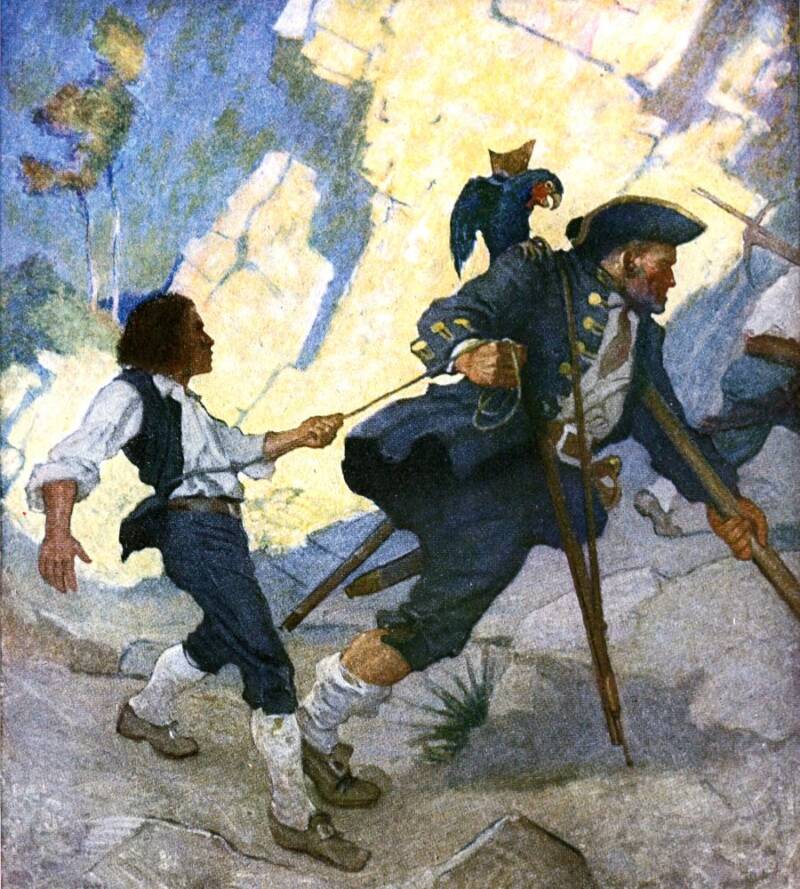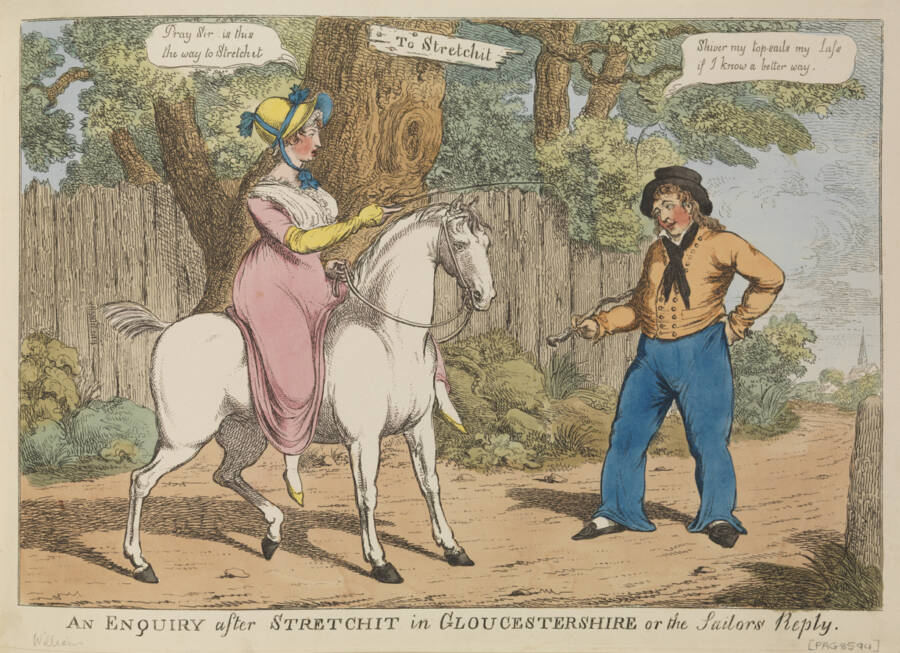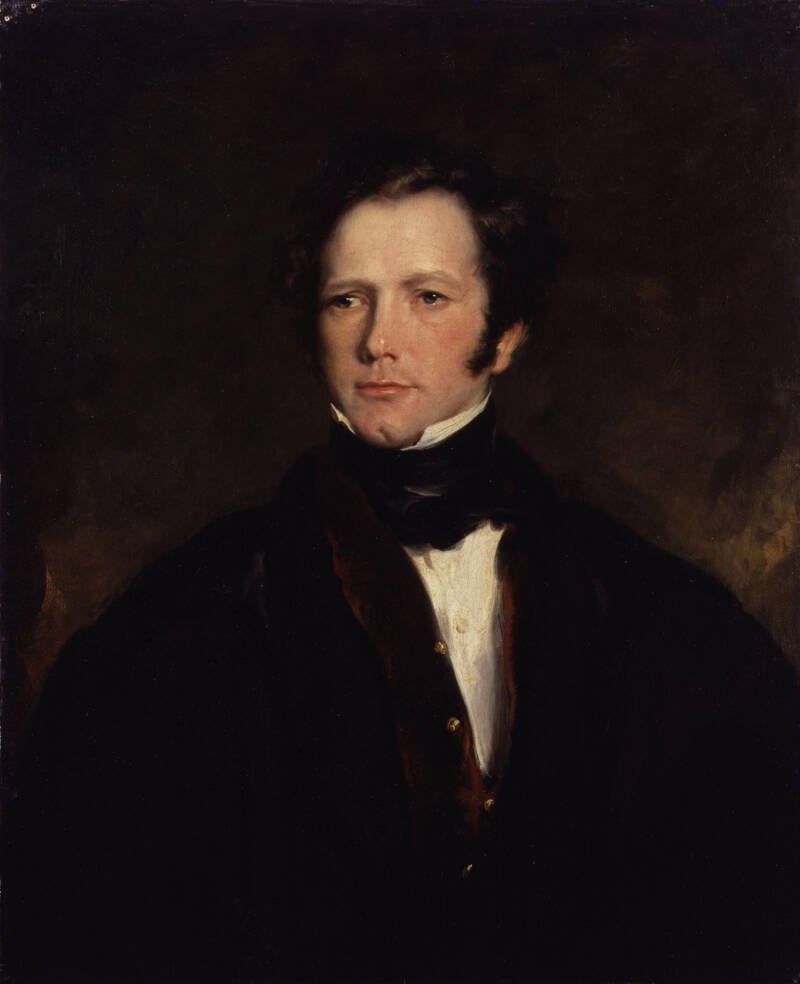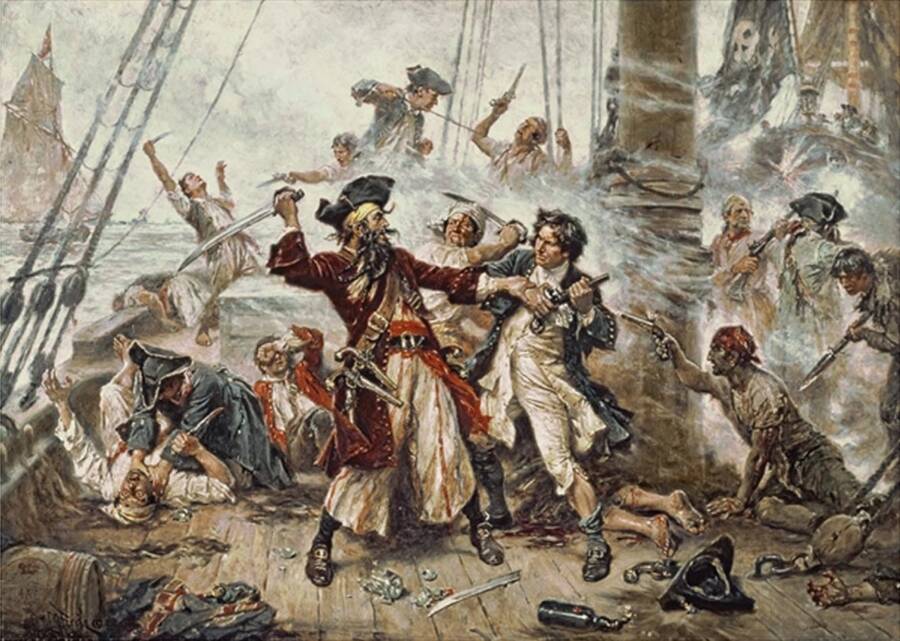The expression "shiver me timbers" was first recorded in print in 1795, and since then, it's appeared everywhere from Treasure Island to SpongeBob SquarePants. But it's unclear whether this phrase was ever truly part of the pirate vernacular.
The phrase “shiver me timbers” has been attributed to pirates in literature and pop culture for centuries. But is there any proof that the seafaring buccaneers actually uttered the expression? And what exactly does “shiver me timbers” mean?
The saying became widely associated with pirates after Robert Louis Stevenson included it in his classic novel Treasure Island in 1883. In fact, the famous character Long John Silver recites iterations of the phrase several times throughout the book.

Wikimedia CommonsThe pirate Long John Silver in Robert Louis Stevenson’s Treasure Island (1883) cemented the phrase “shiver my timbers” — which eventually evolved into “shiver me timbers” in pop culture.
However, “shiver me timbers” dates back much farther than the 19th century. Variations of the phrase, including “shiver my timbers,” appear in print as early as 1795.
Though the origins of the expression are murky, tracing its path through the ages reveals that it has a swashbuckling history of its own — whether real pirates used it or not.
What Does “Shiver Me Timbers” Mean?
According to the Oxford English Dictionary, one early definition of “shiver” is “to break or split into small fragments or splinters.” And “timber” is “wood used for the building of houses, ships, etc.” In the context of ships specifically, the “timbers” were the wooden support frames of the vessel.
When the phrase is put together, “shiver me timbers” suggests a ship breaking into pieces, perhaps due to the force of a strong wave or a cannonball. But aside from the dictionary definition, the expression has several less literal interpretations.

Wikimedia CommonsA replica of a 17th-century Spanish galleon, a wooden ship that may have had its “timbers shivered.”
In books and movies, the saying has often been used as an exclamation of shock or surprise. For instance, in Treasure Island, Long John Silver says, “Here’s Jim Hawkins, shiver my timbers!” when he unexpectedly runs into the story’s protagonist and primary narrator.
Pirates or sailors may have also used the phrase as an oath. A character in the 1834 novel Jacob Faithful by Frederick Marryat stated, “I won’t thrash you, Tom. Shiver my timbers if I do.” In this context, the speaker is calling upon a higher power to strike him down if he is lying.
All of these various meanings have appeared in literature and film throughout the centuries. But the question remains: Did pirates really use the expression?
Tracing The History Of “Shiver Me Timbers”
The expression “shiver my timbers” first appeared in print in 1795 in a serial publication called “The Tomahawk! or, Censor General.” The series was published every Tuesday, Thursday, and Saturday morning and claimed to “discuss, with candour and spirit, every leading topic of the moment; and afford to every rational Briton, a clear view of every great, interesting, or amusing question that is the subject of general attraction, or worthy the public notice.”
In one excerpt titled “Navy,” a character called Old Sailor says, “Peace? — Shiver my timbers! what a noise ye make — ye seem to be fonder of peace than ye be of quiet.”
Another character responds, “Here be’s a man as is abusing of ye, come an lather him.” The Old Sailor then says, “Lather me! — Shiver my timbers! if so be he comes athwart me — I’ll soon lower his topsails for him.”

National Maritime Museum/Wikimedia Commons In an innuendo-laden cartoon from circa 1800, a sailor exclaims “shiver my top-sails” in response to a young woman’s question.
In this exchange, the Old Sailor seemingly uses the expression as an interjection of surprise and annoyance.
In 1832, an article in The Times of London wrote: “…shiver my timbers if I shall ever forget it,” employing the phrase as an oath.
Then, of course, Long John Silver uttered the expression — and variations of it such as “shiver my soul” and “shake up your timbers” — numerous times in Treasure Island. But it’s unclear whether Stevenson incorporated it as an artistic flourish or if he knew that the saying really was used on the high seas.
It’s Marryat’s use of the expression in Jacob Faithful that provides what may the best clue to the true history of “shiver me timbers.”
The Seafaring Life Of Captain Frederick Marryat
According to the United States Naval Institute, Frederick Marryat was born in London in 1792. He was drawn to the sea from an early age and reportedly tried to run away from home to set sail multiple times.
At the young age of 14, he joined the Royal Navy as a midshipman on the warship H.M.S. Imperieuse. By 1823, he’d been promoted to Captain. Over the course of his career at sea, Marryat also invented a lifeboat and developed his own system of maritime flag signals.

Public Domain Captain Frederick Marryat.
Later in his life, Marryat started writing novels, many of which revolved around nautical themes — including Jacob Faithful.
It’s evident that Captain Marryat would have had inside knowledge of the terminology that sailors were using at the time. If he wrote that a seaman used the phrase “shiver my timbers,” it’s likely that it was a recognized expression.
However, in the years since Marryat and Stevenson used the saying in their novels, “shiver me timbers” has taken on a life of its own.
How This Iconic Nautical Phrase Has Changed Over Time
After Treasure Island created an unwavering connection between the expression “shiver my timbers” and pirates in pop culture, other books — and later television shows and movies — expanded upon it. When films with sound emerged in the 1920s and the stereotypical spoken pirate accent evolved, the “my” eventually transformed into “me.”
An early episode of Popeye the Sailor Man from 1934 is titled “Shiver Me Timbers!” The iconic character also speaks the phrase several times throughout the series.
Another famous cartoon character, Mr. Krabs from SpongeBob SquarePants, often exclaims “shiver me timbers” in his pirate-like dialect.

Wikimedia CommonsCapture of the Pirate Blackbeard, 1718.
In the end, it’s difficult to say whether or not pirates truly used the phrase. There are, of course, no recordings of real 18th-century pirates speaking, and any relevant written records from the period are few and far between.
But regardless of whether or not Blackbeard or Calico Jack walked the deck of their ships shouting “shiver me timbers,” the emblematic expression has certainly stood the test of time.
After learning about the origins and meaning of “shiver me timbers,” brush up on your pirate lore and read about 21 pirates who put Captain Jack Sparrow to shame. Then, discover the history behind the Jolly Roger flag.





